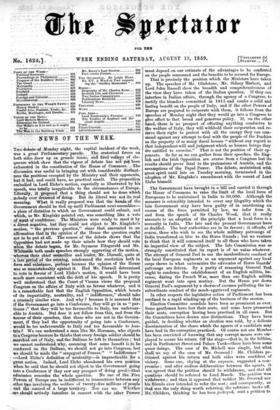NEWS OF THE WEEK.
THE debate of Monday night, the capital incident of the week, was a great Parliamentary parade. The oratorical forces on both sides drew up en grande tenne, and fired volleys of elo- quence which show that the vigour of debate has not yet been exhausted in the constitution of the House of Commons... The discussion was useful in bringing out with considerable distinct- ness the positions occupied by the Ministry and their opponents, but it had, and could have, no practical result. The proposition embodied in. Lord Elcho's motion, especially as illustrated by his • speech, was Wally inapplicable to the circumstances of Europe. literally, it proposed that a thing should not be done which nobody ever dreanied of doing. But its literal was not its real meaning. What it really proposed was that the hands. of the Government should be tied up until Parliament next assembles— a piece of dictation to which no Government could submit, and which, as Mr. Kinglake pointed out, was something like a vote of want of confidence. The Ministers were ready to meet it by a direct negative, hut they eoUld. not object. to Mr. Kinglake's motion, " the previous question," since that; amounted to an affirmation that m the opinion of the Howie the question ought not to be put at all. The course of the debate shows that the Opposition had not made up their minds how they should vote when the debate began, for Mr. Seymour Fitzgerald and Mr. Whiteside both made speeches strongly approving' of the motion, whereas their chief councillor and leader, Mr. Disraeli, quite at a late period of the evening, coidemned- the resolution both in form and sulitance, -Perhaps because the opinion of the House was so unmistakeably against it.' Had Mr. Disraeli determined to vote in favour of Lord Elcho's motion, it would have been much more consistent with the drift of his speech. It is pretty well understood that the Court of Vienna views the proposed Congress on the affairs of Italy with no favour whatever,- and it is a remarkable fact' that the English Opposition, which boasts of its impartiality, neutrality, and " indifference," should take a precisely similar view. And why ? because it is assumed that if the Government go into a Conference, they will go in as " par- tisans ;" that they will be too favourable to Italy, too unfavour- able to Austria. But does it not folloiv from this, and from the tenour of their speeches, that those who are not in the Govern- ment, if they had the opportunity of going into a Conferenoe, . would be too unfavourable to Italy and too favourable to Aus- tria ? We can understand a man like Mr. Horsman, who, objects to a`Congress because he thinks that every foreign soldier should be marched out of Italy, and the Italians be left to themselves ; but we cannot understand why, assuming that some benefit is „to be conferred on the Italians, we should not go into Congress; lest we should be made the " scapegoat of France." " Indifference " —Lord Fiche's definition of nentrality—is impracticable for a great nation. Indeed, Lord- Eleho abandoned his own position when he said that he should not object to the Government_leing into a Conference if they saw any prospect of doing goolithat admission concedes the whole question. No one of the Five Powers of Europe can be indifferent to transactions between any other two involving the welfare of twenty-five millions of 'people and the control of a large territory. Nor can we. Whether •
- eve should actively interfere in concert with the other Powers must depend on our estimate of the advantages to be oonferred on the people concerned and the benefits to be secured for Europe.
That is precisely the position which the Ministers have taken up. The speeches of Mr. Gladstone, Mr. Sidney Herbert, and Lord John Russell show the breadth and comprehensiveness of the view they have taken of the Italian question. If they can interfere in Italian affairs, through the agency of a Congress, to rectify the blunders committed in 1815 and confer a solid and lasting benefit on the people of Italy, and if the other Powers of Europe are prepared to cooperate with them, it follows from the speeches of Monday night that they would go into a Congress to give effect to that broad and generous policy. If, on the other hand, there is no prospect of effecting anything conducive to the welfare of Italy, they will withhold their cooperation and re- serve their right to protest with all the energy they can com- mand against any attempt to deal with the people of the Duchies as the property of so many ducal houses " without any regard to that independent will and judgment which as human beings they kic entitled to exercise." That is not the position of their op- ponents. So far as we can gather from their speeches, the Eng- lish and the Irish Opposition are averse from a Congress lest its results should prove fatal to the pretensions of. Austria, and the assumptions of the Papal Power. The debate, maintained with great spirit until late on Tuesday morning, terminated in the adoption of Mr. Kinglake's amendment with the assent of Lord Echo himself.


























